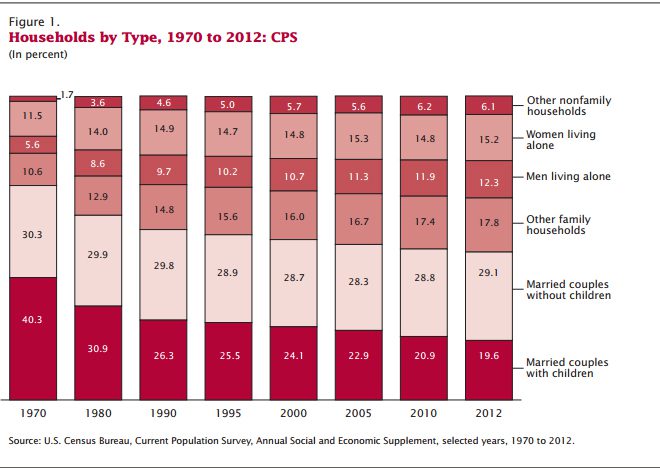
Dear Thoughtful Pastor: What ARE traditional family values and who decided? Why is it such a buzz word and why is it a red flag to some of us? Who says my values are untraditional? And if they are whose business is it? What is the obsession with uniformity and control? How do these values improve all families lives? Who is really being controlled here and why. How do people who preach these value really live? How about their followers? Did Jesus’ family have traditional family values? Did any of the people he hung out with?
And who benefits the most from extolling these values?
We’ve got to start here by defining “family.”
According to US Census data, married couple with children comprise about 20% of US family households. The number of people living alone has dramatically risen as has the number of childless couples. About 18% of the US population live in what are considered “other family households,” i.e., people living together, same-sex couples, etc.
From what I can tell, those who espouse “traditional family values” point to the period after WWII. After the extreme disruption of the war, the men who survived came home and entered the workforce while the women gave up their wartime jobs.
The nuclear family arrangement emerged: a married couple and their children, separating from other family members by purchasing their own homes. This was a unique time in history when wages were high enough relative to housing and other living expenses so a middle-class family could live with reasonable comfort on a single income.
From what I can tell, the family value household model springs from that time, which did appear to be a more socially stable time than today.
Unless, of course, it wasn’t.
It certainly wasn’t particularly stable or pleasant for non-white households. Segregation and economic deprivation were the norm, often reinforced by extreme violence.
It certainly wasn’t pleasant for women in abusive and degrading marriages. Divorce was difficult and full of shame. Employment opportunities massively favored white men, no matter what the occupation.
In addition, poor women, no matter what their skin color, have always worked in generally extremely low wage jobs. Always.
 Only three respectable occupations were widely available to emerging boomer women: nurse, secretary and teacher. Most women assumed, even when preparing for one of those fields, that they would meet an eligible man soon and quickly exit the workforce.
Only three respectable occupations were widely available to emerging boomer women: nurse, secretary and teacher. Most women assumed, even when preparing for one of those fields, that they would meet an eligible man soon and quickly exit the workforce.
The Family Research Council (FRC), who employed confessed serial molester and adulterer Josh Duggar as their spokesman, probably plays the most prominent role in pushing the hope of returning to the cultural setting. They very much want to repeal “no-fault” divorce laws. They define the family only in terms of the one-man/one-woman household. No other possible models fit for them.
You asked, “Who really is being controlled?” Primarily women. That’s pretty evident. Within the family values movement, we often see significant rhetoric railing against female empowerment, UNLESS the female being empowered can also be sexually subjugated by the men with more power.

![By Sgt. Christopher Tobey [Public domain], via Wikimedia Commons](https://wp-media.patheos.com/blogs/sites/667/2016/09/Roger_Ailes_June_2013-flipped.jpg)
But we face a bigger problem. When looking at families described in the Bible, we generally see a much larger household consisting of multiple generations, distant relatives and unrelated servants, all bound together for economic survival. Everyone was expected to contribute to the greater good. Everyone was a part of some family.
If Jesus was not married, then he was anything but a typical family values guy of his time. If he and his followers did abandon their occupations and go wandering around the wilderness, those very men were putting their families at risk of starvation. In Matthew 12, Jesus is quoted as disrespectfully disowning his mother and brothers in favor of calling his disciples his family.
BUT . . . there is another point here. There is little question but that children do have a greater tendency to thrive when their family situations are stable. Intact families do tend to have far more economic success as well.
The support of good and healthy families benefits our entire society. We simply need to find a way to support the family that gives space for everyone to thrive. Time to expand the definition of family that encompasses the wider world, not just an increasingly small subgroup.
[Note: a version of this column is scheduled to run in the Sept 9, 2016, edition of the Denton Record Chronicle. The Thoughtful Pastor, AKA Christy Thomas, welcomes all questions for the column. Although the questioner will not be identified, I do need a name and verifiable contact information in case the newspaper editor has need of it. Please email questions to: [email protected].]













